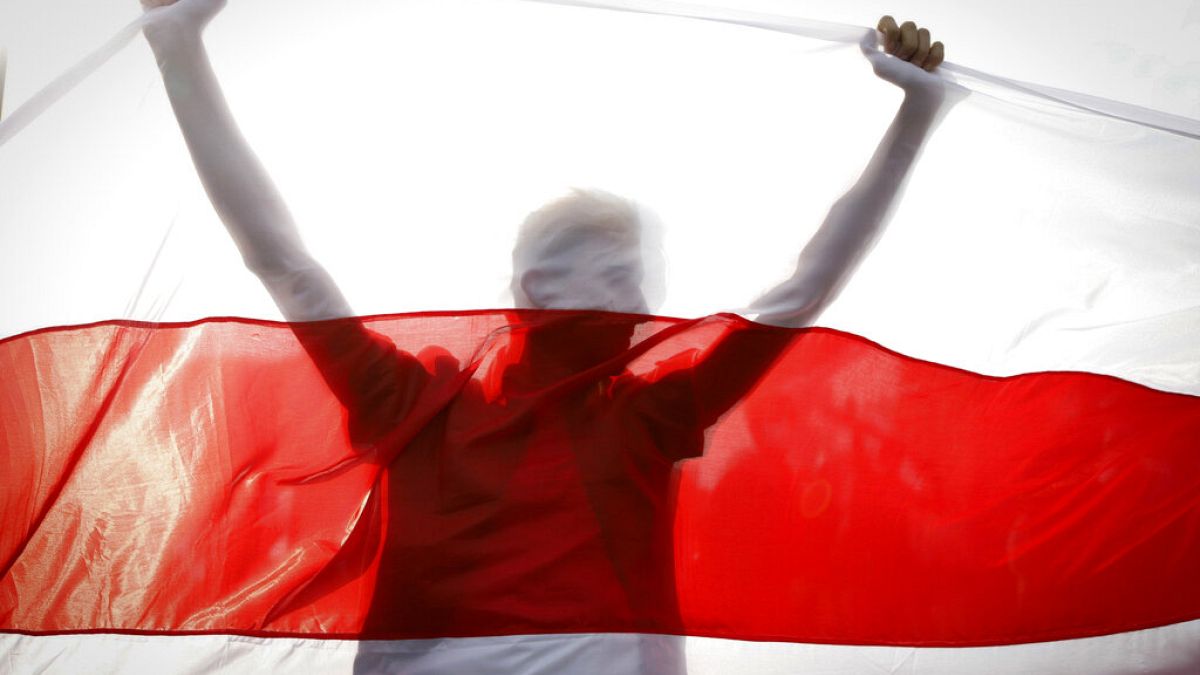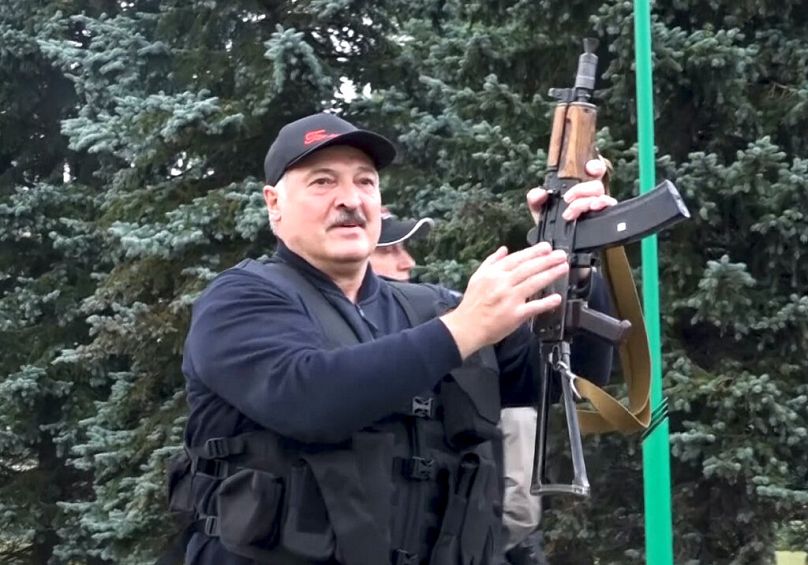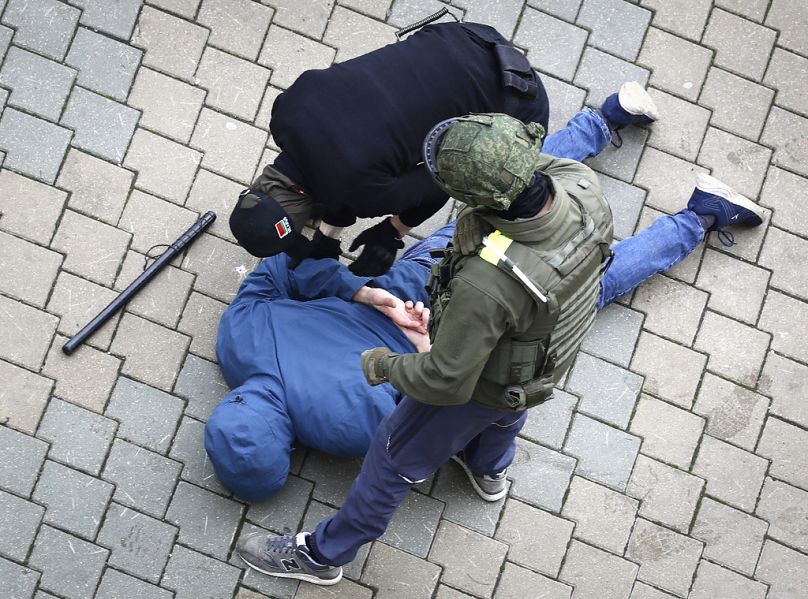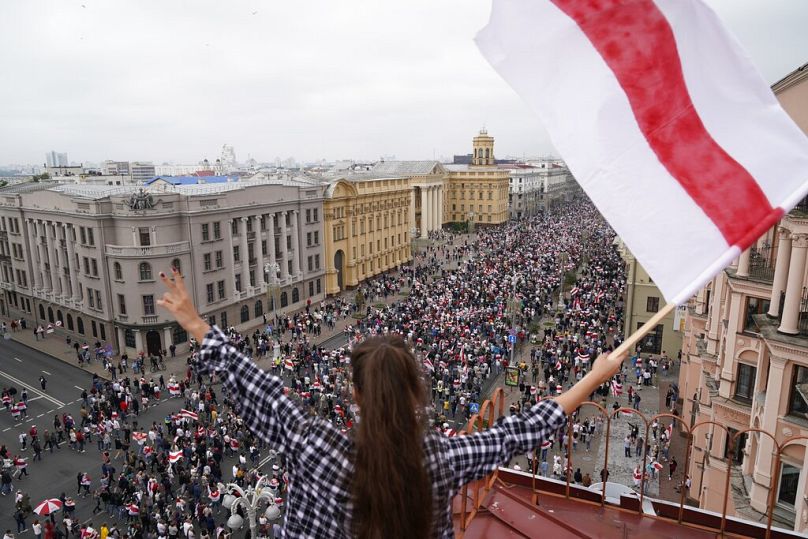"Putin and Lukashenko want the old Iron Curtain between Belarus and Europe," one politician told Euronews, warning against imposing restrictions on Belarusian citizens.
Belarusian friends could be turning to foes in Lithuania.
Like neighbouring Poland, the small Baltic country has welcomed tens of thousands of Belarusian exiles since Minsk viciously cracked down on a 2020 protest movement.
But Russia’s war in Ukraine changed everything.
It amplified fears in some quarters that citizens of Belarus, a staunch ally of Russia, could pose a security risk to Lithuania, leading the country’s lawmakers to consider banning visa and residency permits for Belarusians.
Throw into the mix the arrival of thousands of Russian Wagner mercenaries into Belarus in July and some worriers have gone into overdrive.
“We understand the security risks posed by [Belarusian President Alexander] Lukashenko’s regime of a possible infiltration with agents to Poland and Lithuania and there is no simple solution here. But we also know the policy of blanket bans doesn't work,” Franak Viačorka, a Belarusian opposition politician, told Euronews.
“The secret services of Russia and Lukashenko will just find any other way.”
Viačorka was also afraid of the “symbolic consequences” any clampdown could have, potentially aiding those in power in Moscow and Minsk.
“Putin and Lukashenko want the old Iron Curtin between Belarus and Europe… because it will help fix Russian control over Belarus. They want to isolate Belarusians, leaving them with no connections to the outside world.”
“Then the regime can commit atrocities with impunity. People will stand alone against its terror.”
He claimed “propaganda” TV channels in Belarus have already jumped upon Lithuania’s possible restrictions on Belarusian nationals, calling it "exactly" what the regime wants.
Between 2020 and 2021, Belarusian security forces crushed massive anti-government protests, sparked by Lukashenko's re-election, which was considered rigged by the international community, including the EU.
More than 35,000 people were arbitrarily detained during that period, according to the United Nations High Commissioner for Human Rights. Many experienced violence, threats, ill-treatment and inhumane detention conditions.
Belarusian authorities have since escalated smear campaigns and prosecutions against political and civic activists, journalists and human rights defenders on trumped-up charges, as per a Human Rights Watch report.
Yet, Belarusian exiles - numbering around 58,000 inside Lithuania, according to data cited by AP - have become an increasingly thorny issue, as relations between Vilnius and Belarus have soured.
Not only has Minsk funnelled irregular migrants into both Lithuania and Poland, which have been called a form of hybrid war, but Vilnius also holds Russia and Belarus equally responsible for the invasion of Ukraine.
Security concerns have inevitably risen. Bordering the Russian enclave of Kaliningrad, Lithuania was once part of the USSR and now feels threatened by a revisionist Russia, backed by Belarus.
In March, Lithuania's parliament put forward a bill banning Belarusian and Russian nationals from obtaining Lithuanian citizenship, owning property, applying for visas or extending their residence permits.
It was eventually watered down, with more controversial provisions dropped, but now lawmakers may again consider imposing visa and residence permit bans for Belarusians. A vote is expected in September.
“We will be grateful to Lithuania no matter what,” said opposition politician Viačorka.
"We see Lithuania as one of the closest countries to us. [More restrictive policies] could harm all the good things the country has done over the years for Belarusians. It is important not to spoil all that relationship capital we have built with fast decisions."
'Prisoners in Belarus'
While he recognised “some threat”, Lithuanian Labour MP Andrius Mazuronis said slapping restrictions on Belarusians would “make huge problems”.
Many exiles are young, highly educated individuals, “who share our values and see the situation in Ukraine in exactly the same way as we do,” he said. "The regime in Belarus will change... and people with a Western mind will be able come back and recreate their country as a normal, European-orientated state."
"That's why we need to host these people in the medium to long term."
And it's not only the Belarusian opposition that benefits.
Lithuania has felt a “positive” impact, with Belarusian professionals playing an important role in the country’s burgeoning tech and IT sectors, plus many companies have relocated from Belarus, according to Mazuronis.
“Belarusians have settled down here and integrated into our society,” he told Euronews. “If we would close the border, I think our economy would face some serious challenges.”
Careful background checks by Lithuania’s migration and intelligence services could mitigate many security issues, Mazuronis said, suggesting lawmakers should make them stronger and deeper.
He noted nearly 1,000 Belarusian citizens had been refused entry on security grounds, showing the Migration Department was doing an “important and impressive” job.
Still, Mazuronis aired a note of caution, amid fears Wagner mercenaries in Belarus may stage a provocation on NATO’s borders.
"Society feels threatened because they still remember how fast things can develop. We saw it with Ukraine. Lithuanian officials had talked about it [the threat of Russia] for many years - unfortunately, no one in Western capitals was listening," he said.
Authorities have recently sent questionnaires to Russians and Belarusians living in Lithuania aimed at proving their loyalty, asking questions about who rightfully owns Crimea and their views towards the war.
For Viačorka, such policies mistakenly equated the two.
“Belarusians are not Russian,” he told Euronews. “It is helping Lukashenko’s propaganda: They want to make Belarusians perceived the same as Russia.”
“It is simply not true”.
Polling by independent Belarusian sociologist Andrei Vardomatsky found only 11% of his compatriots were in favour of Belarus participating in the fighting in Ukraine, whereas in Russia attitudes towards the war are more unclear.
Meanwhile, two-thirds of those surveyed are against Russia’s use of Belarus as a staging point for attacking Ukraine.
“The most important thing in my point of view is the purpose of closing up the border?", asked Mazuronis.
While he accepted it might send a political message to the Belarusian and Russian regimes, the Labour MP doubted if it would improve Lithuania’s security situation or decrease the possible threat coming from Moscow.
He also invoked history: “We should not forget that after the Second World War, thousands of Lithuanians ran from the Soviet regime. People went desperately. But they were able to eventually come back and build our country from scratch."
“I am sure that many Belarusians are willing to do exactly the same,” he added.



